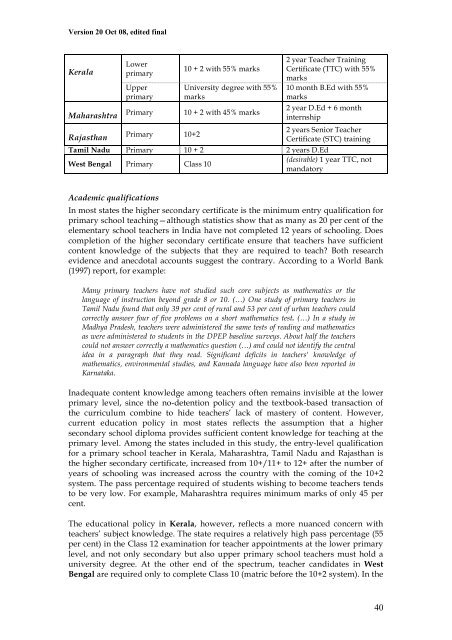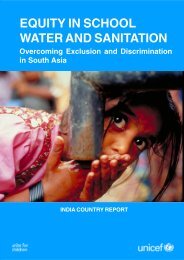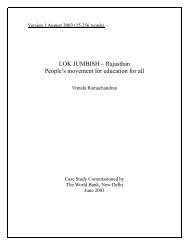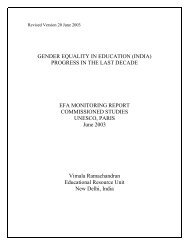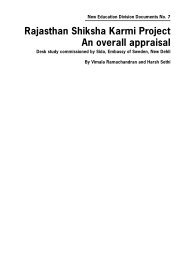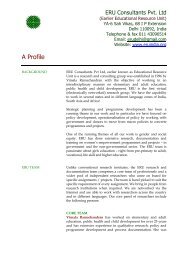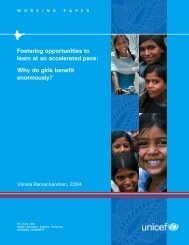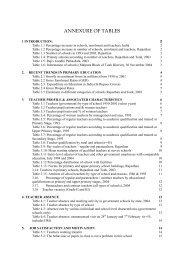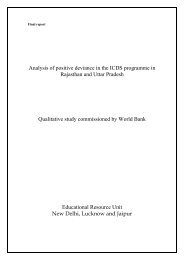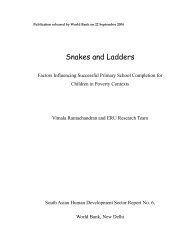primary school teachers the twists and turns of everyday practice
primary school teachers the twists and turns of everyday practice
primary school teachers the twists and turns of everyday practice
Create successful ePaper yourself
Turn your PDF publications into a flip-book with our unique Google optimized e-Paper software.
Version 20 Oct 08, edited final<br />
Kerala<br />
Maharashtra<br />
Rajasthan<br />
Lower<br />
<strong>primary</strong><br />
Upper<br />
<strong>primary</strong><br />
Primary<br />
Primary 10+2<br />
10 + 2 with 55% marks<br />
University degree with 55%<br />
marks<br />
10 + 2 with 45% marks<br />
2 year Teacher Training<br />
Certificate (TTC) with 55%<br />
marks<br />
10 month B.Ed with 55%<br />
marks<br />
2 year D.Ed + 6 month<br />
internship<br />
2 years Senior Teacher<br />
Certificate (STC) training<br />
Tamil Nadu Primary 10 + 2 2 years D.Ed<br />
West Bengal Primary Class 10<br />
(desirable) 1 year TTC, not<br />
m<strong>and</strong>atory<br />
Academic qualifications<br />
In most states <strong>the</strong> higher secondary certificate is <strong>the</strong> minimum entry qualification for<br />
<strong>primary</strong> <strong>school</strong> teaching—although statistics show that as many as 20 per cent <strong>of</strong> <strong>the</strong><br />
elementary <strong>school</strong> <strong>teachers</strong> in India have not completed 12 years <strong>of</strong> <strong>school</strong>ing. Does<br />
completion <strong>of</strong> <strong>the</strong> higher secondary certificate ensure that <strong>teachers</strong> have sufficient<br />
content knowledge <strong>of</strong> <strong>the</strong> subjects that <strong>the</strong>y are required to teach? Both research<br />
evidence <strong>and</strong> anecdotal accounts suggest <strong>the</strong> contrary. According to a World Bank<br />
(1997) report, for example:<br />
Many <strong>primary</strong> <strong>teachers</strong> have not studied such core subjects as ma<strong>the</strong>matics or <strong>the</strong><br />
language <strong>of</strong> instruction beyond grade 8 or 10. (…) One study <strong>of</strong> <strong>primary</strong> <strong>teachers</strong> in<br />
Tamil Nadu found that only 39 per cent <strong>of</strong> rural <strong>and</strong> 53 per cent <strong>of</strong> urban <strong>teachers</strong> could<br />
correctly answer four <strong>of</strong> five problems on a short ma<strong>the</strong>matics test. (…) In a study in<br />
Madhya Pradesh, <strong>teachers</strong> were administered <strong>the</strong> same tests <strong>of</strong> reading <strong>and</strong> ma<strong>the</strong>matics<br />
as were administered to students in <strong>the</strong> DPEP baseline surveys. About half <strong>the</strong> <strong>teachers</strong><br />
could not answer correctly a ma<strong>the</strong>matics question (…) <strong>and</strong> could not identify <strong>the</strong> central<br />
idea in a paragraph that <strong>the</strong>y read. Significant deficits in <strong>teachers</strong>' knowledge <strong>of</strong><br />
ma<strong>the</strong>matics, environmental studies, <strong>and</strong> Kannada language have also been reported in<br />
Karnataka.<br />
Inadequate content knowledge among <strong>teachers</strong> <strong>of</strong>ten remains invisible at <strong>the</strong> lower<br />
<strong>primary</strong> level, since <strong>the</strong> no-detention policy <strong>and</strong> <strong>the</strong> textbook-based transaction <strong>of</strong><br />
<strong>the</strong> curriculum combine to hide <strong>teachers</strong>’ lack <strong>of</strong> mastery <strong>of</strong> content. However,<br />
current education policy in most states reflects <strong>the</strong> assumption that a higher<br />
secondary <strong>school</strong> diploma provides sufficient content knowledge for teaching at <strong>the</strong><br />
<strong>primary</strong> level. Among <strong>the</strong> states included in this study, <strong>the</strong> entry-level qualification<br />
for a <strong>primary</strong> <strong>school</strong> teacher in Kerala, Maharashtra, Tamil Nadu <strong>and</strong> Rajasthan is<br />
<strong>the</strong> higher secondary certificate, increased from 10+/11+ to 12+ after <strong>the</strong> number <strong>of</strong><br />
years <strong>of</strong> <strong>school</strong>ing was increased across <strong>the</strong> country with <strong>the</strong> coming <strong>of</strong> <strong>the</strong> 10+2<br />
system. The pass percentage required <strong>of</strong> students wishing to become <strong>teachers</strong> tends<br />
to be very low. For example, Maharashtra requires minimum marks <strong>of</strong> only 45 per<br />
cent.<br />
The educational policy in Kerala, however, reflects a more nuanced concern with<br />
<strong>teachers</strong>’ subject knowledge. The state requires a relatively high pass percentage (55<br />
per cent) in <strong>the</strong> Class 12 examination for teacher appointments at <strong>the</strong> lower <strong>primary</strong><br />
level, <strong>and</strong> not only secondary but also upper <strong>primary</strong> <strong>school</strong> <strong>teachers</strong> must hold a<br />
university degree. At <strong>the</strong> o<strong>the</strong>r end <strong>of</strong> <strong>the</strong> spectrum, teacher c<strong>and</strong>idates in West<br />
Bengal are required only to complete Class 10 (matric before <strong>the</strong> 10+2 system). In <strong>the</strong><br />
40


